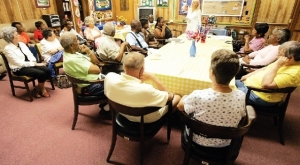Seniors learn about common scams
By Laura Collins
Published in News on July 14, 2010 1:46 PM

Troy Herring
Cherry Hill speaks to a group of senior citizens at the Senior Center in downtown Goldsboro during a seminar on how to spot and avoid scams. Senior citizens in the United States are one of the highest targeted age groups for scammers to attack.
Area seniors filled a room at the Wayne County Senior Center Tuesday to hear how they can avoid financial scams that often target senior citizens.
Cherry Hill, a financial and housing counselor with Consumer Credit Counseling Service, taught the workshop. She said that seniors make up to 90 percent of fraud victims.
She warned those in attendance that not all scams are Internet-based. Many she described are attempted over the telephone.
She said to never give bank account information over the phone to someone that has called you.
One of the more popular scams is the "Grandma, it's me" scam in which someone calls pretending to be a grandchild in trouble and asks to have money sent to them.
The caller typically says, "It's me" and waits for the senior to guess the name of the "grandchild" and then adopts that name during the conversation.
Other phone scams include calls from someone claiming to be a part of the government notifying the senior that they are eligible for grants, Medicare discount cards or Social Security benefits. The caller then asks for a bank account number so they can deposit the money.
"If you want to know if you're entitled to additional Social Security benefits, hang up the phone and call them yourself," Ms. Hill said.
Some of the more well-known scams have now generated offshoot scams. Popular scams claiming someone has won the lottery in another country and needs to pay the taxes on it in order to receive the money are clearly a scheme to steal someone's money, she said. But now people are calling soon after pretending to be from a bank saying they're looking into a recent fraud call and need the person's bank account number to return funds that were paid to the scam.
Ms. Hill's basic rule of thumb is to never pay money to receive a prize and to never give out bank account information. Someone's bank will already have that information and wouldn't need to ask, she pointed out.
In addition to phone scams, Ms. Hill warned seniors of someone coming door-to-door offering home repair and requiring payment up front.
One of the more popular scams, "the toilet bowl scam," is when someone asks to use a bathroom, then tells the homeowner it has a leak that needs to be fixed and the flooring underneath is rotting and needs to be replaced. The person requires payment up front and then doesn't come back to do any work. Often, a few days later, another person claiming to be a quality control inspector comes by and tells the homeowner they were the victim of a repair fraud and offers to redo the work. That person, too, is part of the scam.
Another door-to-door scam is when someone comes to your house and says it won't pass a home inspection then offers to do the work to bring the house up to code.
"If you didn't call and ask them to come out to your home to do repair work, then say no," Ms. Hill said.
She also warns seniors to be wary about caregivers that try to isolate them from their family and friends, try to intimidate or influence them or ask for power of attorney. And she reiterated the importance of keeping track of credit card and bank account statements.
"When your statements come in, look at them. Make sure the charges on there are charges you made," Ms. Hill said.
The fraud workshop is one of several financial workshops that will be held monthly through February at the Senior Center.
Eryn McAuliff, the director of Wayne County Services on Aging, said the workshops are an effort to help keep seniors informed.
"Seniors are constantly being targeted for scams," she said. "They have financial questions and live on fixed incomes so any financial advice we can provide is beneficial."
Seniors who have been a victim of fraud can call the National Center on Elder Abuse at 1-800-677-1116, as well as the credit card or bank and the police department.
The next workshop is at 9:30 a.m. Aug. 10 at the Senior Center at 100 S. John St. It will focus on creating spending plans.
